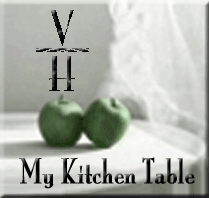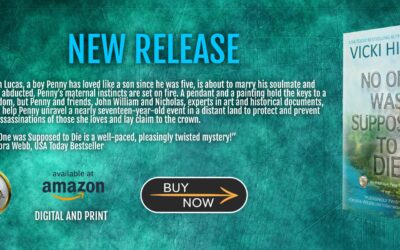BROKEN FRIENDSHIPS
© 2011, Vicki Hinze WARNING: This is a no-edit zone…
Friendship is a gift. Having someone in your inner circle to talk with, share things with—to be a cheerleader for, and to have cheering for you—is a blessing. Friends remind you of who you are when you forget. They lift you up when you’re down, celebrate with you when you soar, and suffer with you when you’re nose down on the ground and can’t see “up” on your own.
Friends are honest with you. They don’t feed your ego, they tell you the truth as they see it. If you’re making a mistake, and you ask for their opinion, they give it, and whether or not you take it, they remain on your side. If you prove right, they’re glad. If you prove wrong, they don’t say I told you so, they help you seek a solution to overcome the challenges created or the obstacles now in your path.
Having a friend is a wonderful thing. And understanding that to have a friend you have to be a friend is critical to friendship. You can’t just take from a friend, you have give, too, otherwise, it’s not friendship, it’s using someone else for your own benefit.
Friends are the extended family you choose to bring into your circle and you allow to bring you into their circle. In other cases, friends are people you’ve come to know and trust—either in all areas of your life, or in specific areas of your life.
Not all friends are equal.
Some are lifelong friends. Typically late in life you can count these people on one hand and have fingers left over. They are the ones who’ve been there through good and bad times, stuck with you through thick and thin, helped you make sense of difficult and nonsensical situations. The ones who have worried with you, cried with you, mourned with you. The ones who felt every pain, trudged through every mud puddle, and sensed every success and joy as if it were their own. These friendships are based on mutual respect and deep affection. They are chosen and in cases closer than family. They are rare treasures.
Some friends are fair weather friends. When things are going great or they need something from you, they’re front and center. But the moment you need something, they’re not home. They are available at their convenience and for their purposes. If you’re doing well, they hang onto your coattail, but the moment you falter, they’re gone. These friends are not friends. They’re acquaintances who use others under the guise of friendship. Unfortunately, we encounter many more of them in our lives than true friends.
Some friends are true friends who enter our lives for a season. Meaning, we share some common bond. That bond might be a person, a place (work, or church, or an organization), or a thing (a shared love for reading or writing or skydiving), and so we’re drawn together for so long as the purpose that drew us into each other’s circles exists. When the purpose fades, so too does the friendship. The majority of friends we know in our lifetimes fall into this category.
We’ve all heard the saying that when the student is ready, the teacher will appear or some version of it. Friendships, in many ways, are like that. When a need arises for a person with specific traits—physical, emotional, or spiritual—in our lives, we attract or are attracted to that type person. It isn’t an intentional thing, like it is when you embrace someone to use them as leverage to get something you want. It’s a subliminal thing. You need to understand chemistry and Person X is brilliant at it. You have great reasoning and social skills Person X lacks. So the two of you connect and share to help each other. You recognize common interests and grow close. But only for a time.
These type relationships can be extremely close ones short-term. But then they fade away or explode due to differences. Because while you have things in common, you also have major differences, and how the friendship breaks and/or ends depends on how both of you handle those differences.
Friendships involve emotions. And any time emotions are involved, people can act wacky. They can say and do things that are hurtful—and truly have no idea they’ve hurt. They can say and do things that are cutting—and truly not realize that they’ve cut. The reason is because you’re dealing with two different people who see, perceive and process things in two different ways. Whereas one friend might tell another, “Your dress is too tight.” The friend hearing that perceives she’s being told she’s fat. See what I mean? Emotional reactions.
Friendships, particularly long-term friendships, which break can be a painful thing and their loss felt deeply for a long time. Some, for a lifetime. If the friendship ended with harsh words and hateful talk—whether based in truth or in an emotional outburst—it can seem like a death and the impact is to mourn.
For months or even years, depending on the level of the friendship, there can be times when you want to share something, to talk through something, to do something with your friend, or have stray thoughts that s/he would love or hate this or that. There’s an ache in your heart where that close friend lived. That’s normal and to be expected. Because that person was a friend—you invested, s/he invested. Feeling a little out of sorts and cut-off is normal. Wishing things could be as they once were, before the break, is normal, too.
Sometimes things can be as they were, and sometimes they can’t. Often broken friendships are mended and the bond between friends is stronger for having been tested. But some broken friendships are not mended. You forgive each other for the hurts, you wish each other well, but the season for your friendship is simply over.
That can be a difficult thing to accept. It seems so alien to be so close and then severed. But remember that some friends are in our paths for a purpose, and once the purpose is achieved, then it’s time to enter a new season and hanging on to the old one can actually hamper our personal growth and development.
This doesn’t mean that there must be acrimony or heated exchanges or cold shoulders or any of that kind of behavior. It just means that it’s time for both people to move on. Sometimes you express the greatest affection not by holding on but by letting go.
Letting go is not always easy. Some broken friendships have earned a special place in your heart and remain there the rest of your life. You still care about your friend, still love them, still want what’s best for them. You just care and love and want that best from a distance.
Friendships break. Sometimes you’re at fault, sometimes you’re not. Sometimes there’s disagreement about who is at fault. If it is your fault, take the hit and apologize, do what you can to repair damage you’ve done, and move forward. If you’re not at fault, still work to an honest resolution of the conflict. Sometimes you’ll succeed, sometimes you won’t. Either way, you leave that broken friendship knowing you’ve done what you can to repair it, and your mind can rest easy on the matter however it turns out.
It’s when there’s disagreement about who is at fault that resolutions become most difficult. Sometimes you’re not interested in clearing the air. To you, the offense is so serious, you’re just done with the whole matter. Sometimes, your friend is, and because you respect that friend, you must accept his/her decision.
If the breach is inevitable and permanent, it’s important to forgive that person anyway—whether or not they ever know you’ve forgiven them. It’s important to you. Because carrying the weight of a grudge is a weight that you don’t need to lug around. It impacts your health, your attitude, your willingness to embrace friendships in the future. The goal is to emerge wiser not bitter. When you forgive, you release the upset and anger and retain the wisdom of lessons learned. So it is important to you to forgive.
Forgiving someone, whether or not they’ve asked for it or deserve it, frees you, and that gives you the emotional and physical distance to objectively view what happened. In doing so, you gain insight into what went wrong and why. And that makes you wiser and prepares you for the future, because those lessons aren’t limited just to friendships. They can be applied to all your relationships and interactions with others.
Broken friendships hurt. No doubt about it and no sense in trying to pretend otherwise. They can hurt for a long time. But they can heal, too. They can teach you a lot about yourself and others, give you glimpses of other perspectives and offer lessons on handling difficult situations. But one of the greatest benefits is in coming to understand the power of forgiveness. It is key to healing and imperative for resiliency. It is key to progressing in life.
It is key in determining whether you live your life as one of the walking wounded or whole.
So it is in our lives and in our characters.
Blessings,
Vicki
————————————-
I guest blogged today at Bell Bridge Books. The post is COLOR ME HAPPY. You can read it HERE.





